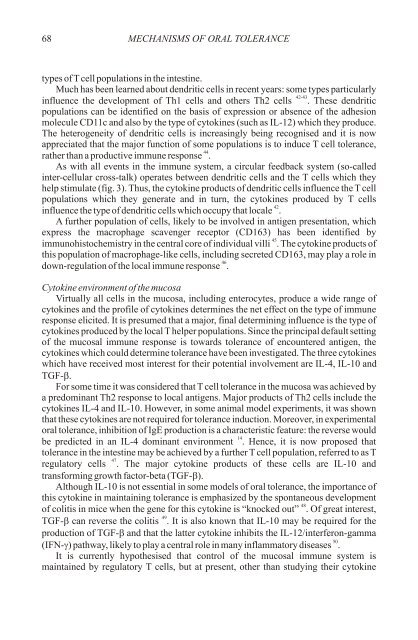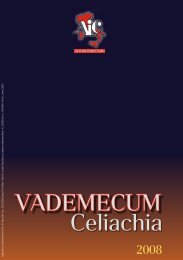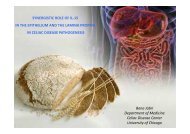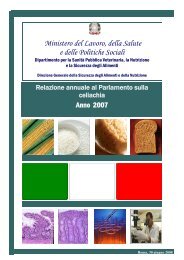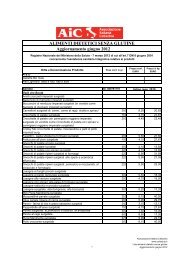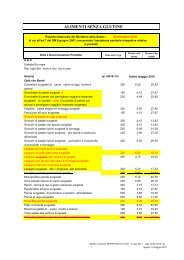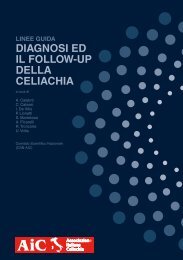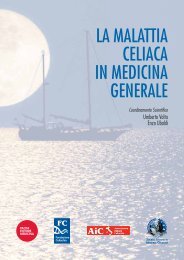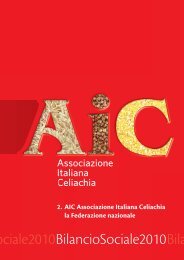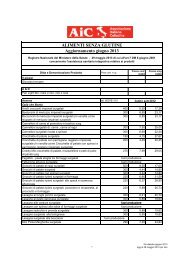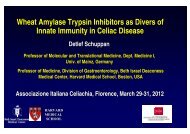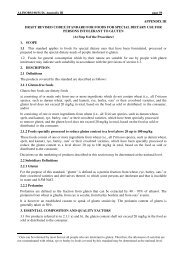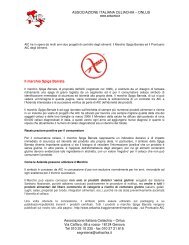primary prevention of coeliac disease - Associazione Italiana ...
primary prevention of coeliac disease - Associazione Italiana ...
primary prevention of coeliac disease - Associazione Italiana ...
You also want an ePaper? Increase the reach of your titles
YUMPU automatically turns print PDFs into web optimized ePapers that Google loves.
68 MECHANISMS OF ORAL TOLERANCE<br />
types <strong>of</strong> T cell populations in the intestine.<br />
Much has been learned about dendritic cells in recent years: some types particularly<br />
42-43<br />
influence the development <strong>of</strong> Th1 cells and others Th2 cells . These dendritic<br />
populations can be identified on the basis <strong>of</strong> expression or absence <strong>of</strong> the adhesion<br />
molecule CD11c and also by the type <strong>of</strong> cytokines (such as IL-12) which they produce.<br />
The heterogeneity <strong>of</strong> dendritic cells is increasingly being recognised and it is now<br />
appreciated that the major function <strong>of</strong> some populations is to induce T cell tolerance,<br />
44<br />
rather than a productive immune response .<br />
As with all events in the immune system, a circular feedback system (so-called<br />
inter-cellular cross-talk) operates between dendritic cells and the T cells which they<br />
help stimulate (fig. 3). Thus, the cytokine products <strong>of</strong> dendritic cells influence the T cell<br />
populations which they generate and in turn, the cytokines produced by T cells<br />
42<br />
influence the type <strong>of</strong> dendritic cells which occupy that locale .<br />
A further population <strong>of</strong> cells, likely to be involved in antigen presentation, which<br />
express the macrophage scavenger receptor (CD163) has been identified by<br />
45<br />
immunohistochemistry in the central core <strong>of</strong> individual villi . The cytokine products <strong>of</strong><br />
this population <strong>of</strong> macrophage-like cells, including secreted CD163, may play a role in<br />
46<br />
down-regulation <strong>of</strong> the local immune response .<br />
Cytokine environment <strong>of</strong> the mucosa<br />
Virtually all cells in the mucosa, including enterocytes, produce a wide range <strong>of</strong><br />
cytokines and the pr<strong>of</strong>ile <strong>of</strong> cytokines determines the net effect on the type <strong>of</strong> immune<br />
response elicited. It is presumed that a major, final determining influence is the type <strong>of</strong><br />
cytokines produced by the local T helper populations. Since the principal default setting<br />
<strong>of</strong> the mucosal immune response is towards tolerance <strong>of</strong> encountered antigen, the<br />
cytokines which could determine tolerance have been investigated. The three cytokines<br />
which have received most interest for their potential involvement are IL-4, IL-10 and<br />
TGF-b.<br />
For some time it was considered that T cell tolerance in the mucosa was achieved by<br />
a predominant Th2 response to local antigens. Major products <strong>of</strong> Th2 cells include the<br />
cytokines IL-4 and IL-10. However, in some animal model experiments, it was shown<br />
that these cytokines are not required for tolerance induction. Moreover, in experimental<br />
oral tolerance, inhibition <strong>of</strong> IgE production is a characteristic feature: the reverse would<br />
14<br />
be predicted in an IL-4 dominant environment . Hence, it is now proposed that<br />
tolerance in the intestine may be achieved by a further T cell population, referred to as T<br />
47<br />
regulatory cells . The major cytokine products <strong>of</strong> these cells are IL-10 and<br />
transforming growth factor-beta (TGF-b).<br />
Although IL-10 is not essential in some models <strong>of</strong> oral tolerance, the importance <strong>of</strong><br />
this cytokine in maintaining tolerance is emphasized by the spontaneous development<br />
48<br />
<strong>of</strong> colitis in mice when the gene for this cytokine is “knocked out” . Of great interest,<br />
49<br />
TGF-bcan reverse the colitis . It is also known that IL-10 may be required for the<br />
production <strong>of</strong> TGF-band that the latter cytokine inhibits the IL-12/interferon-gamma<br />
50<br />
(IFN-g) pathway, likely to play a central role in many inflammatory <strong>disease</strong>s .<br />
It is currently hypothesised that control <strong>of</strong> the mucosal immune system is<br />
maintained by regulatory T cells, but at present, other than studying their cytokine


